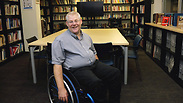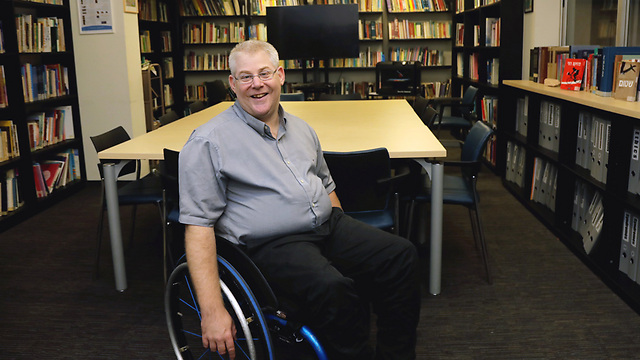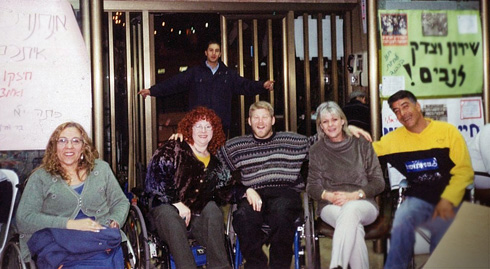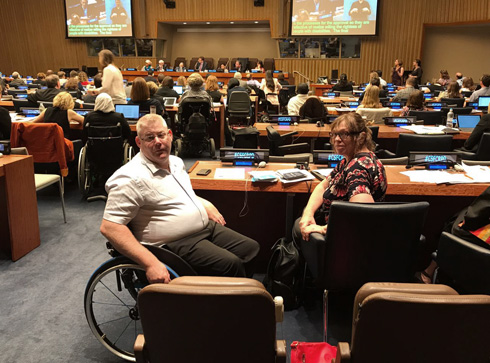
Yoav Kraiem doesn’t understand why he deserves to be interviewed or written about. “My story is not interesting anymore,” he says.
“When you write an article about someone like me who completed an academic degree, for example, it’s like saying: We didn’t expect that, something amazing happened here, like in the example of ‘man bites dog’. In my opinion, providing accessibility to people with disabilities and their ability to do the things that everybody else do should be a natural thing; but apparently, this is still not completely natural.”
In any event, Kraiem is an interesting interviewee, certainly more interesting than many other people appearing in the media. There is no doubt that he is worthy of having an article written about him.
In the Knesset at age 15
Kraiem (41) was born in Ramat Gan to a father who was a literary editor and mother who was a preschool teacher and public activist. As a child with cerebral palsy, he used a wheelchair to move around and also suffered from dyslexia and ADHD. He was forced to fight for his right to study at a regular school and to be part of a peer group of children without disabilities.
To a large extent, this battle succeeded thanks to the unwavering support of his family. As a teenager, he not only studied in a regular high school, but also began becoming extensively involved in public activity. At age 15, he participated in Knesset discussions regarding the State Healthcare Law.
He also took part in the leadership of the struggle of persons with disabilities in 1999 and 2001, was one of the founders of the struggle’s management and took part in many legislative processes.
Currently, he is the Co-Director of Beit Issie Shapiro’s Community Development and Social Change Unit and serves as the Chairman of the National Council for Rehabilitation in the Community for Persons with Intellectual Disabilities and Human Rights at the Ministry of Health and a lecturer at the Ono Academic Campus. He lives in Rehovot and is married to Galit, an educator who also uses a wheelchair to move around.
“In the US, a president was elected who taunted a journalist with disabilities, and an MK in Israel taunted his colleague, an amazing, impressive woman with disabilities. The public was horrified by this, but it's not enough,” says Kraiem.
“I was a very happy child,” he recalls. “My family was very supportive and loving. My problem was always with my external surroundings—with children staring at me, making comments—but they taught me to ignore it. Unfortunately, this situation has not changed. Today, when I walk down the street with my wife and I can hear people behind us saying: ‘Look how nice, they are a couple, they love each other.’ As if to say, ‘wow, they are human.’ This is not such a pleasant place to be and it still exists.”
Your motivation to generate social change seems endless. Where does it come from?
“I think that it comes from the many questions that the external surroundings raise regarding my abilities. It made me undergo many humiliating experiences, but thanks to the resources my parents gave me, I overcame them. As a teenager, when I came to fight for the State Health Insurance Law, I didn’t understand it, and I hadn’t studied the issue in depth; however, I felt it was important to meet people who could ensure that no child had to experience what I had gone through, that the right of the child with disabilities to attend a regular school was guaranteed. I said – ‘I will make sure I get to speak to an MK and tell him – ‘It’s not fair that children have to experience such a thing.’
I am a person who achieved public status at a very early age. The fact that I am considered a success story can only mean one thing: that if I work in the service of others, it will prevent them from experiencing difficulties. This primarily requires my commitment and is my mission.”
Why did you choose not to participate in the present struggle of people with disabilities?
“I decided to stay out of it, but the demonstrators are very brave and are doing their job.”
And how do you see the situation of people with disabilities in today’s society?
“We are in a process of development and change that is not linear, and does not move in one direction. In the US, a president was elected who taunted a journalist with disabilities; and in Israel, an MK taunted his colleague, who is an amazing impressive woman with disabilities. The public was horrified by this, but not enough. People still stare at us on the street. It is still possible that you and I enter a store, and the salesman will speak to you and not to me. There is more accessibility and more integration, but it is still insufficient and is not part of a philosophy that I believe in—equal human rights. A human rights outlook towards various minorities still has not been given its rightful place in Israeli society. First and foremost, I consider myself a human rights activist: I work in the niche of people with disabilities and I belong to that socio-political minority, but I am part of Israel’s human rights movement.”
So, in your opinion, the discriminatory treatment of people with disabilities is discrimination against a minority?
My claim is that even people with complex intellectual disabilities must be given a real place in society, so I need to provide them with complete accessibility. In my opinion, the government has a duty towards its citizens to remove the obstacles in order to enable everyone to become a full and real partner. If the Ethiopians are denied this for one reason, and another reason is added, it doesn’t matter. The result is the same. And the perception stems from the same origin toward everyone.”
You are known as being active in promoting legislation and promoting accessibility, but can these two aspects change the deep-rooted perceptions toward people with disabilities?
“We are talking about integrative tools. If you understand that I am like any other person, you will agree to create accessibility, because you will understand its value. And if there is accessibility and I can go everywhere, I will meet people and they will understand that I am like them, and their attitude toward me will be different. Accessibility is not only a physical issue: it refers to the need for every document to be written in a way that even a person with an intellectual disability will be able to read; there should be a video for those who cannot read, there must be human assistance for someone who has difficulty in getting around; it means sign language, subtitles, and not just a ramp at the entrance to a public place. People with physical disabilities are not the majority in the community of people with disabilities—actually they are a minority. In order to change attitudes, I am an educator, a lecturer at school and I create encounters between people.”
Part of the Revolution
Currently, Kraiem runs the Self-Advocacy Project for People with Intellectual Developmental Disabilities at Beit Issie Shapiro in Ra’anana, in cooperation with Elwyn Israel and with the support of the Ruderman Family Foundation and the Jewish Federation of Los Angeles. The project includes 12 groups from across the country, with 150 people with intellectual disabilities who are working to change their quality of life and to make changes in policy and the services they receive.
Beit Issie Shapiro is a groundbreaking organization working in the field of disabilities, according to the vision that every person with disabilities is a citizen with equal rights who should be actively involved in community life. The organization was established 37 years ago. At first it treated 16 children with disabilities and presently, it has an impact on the lives of approximately 500,000 children and adults. The range of activities includes the development of innovative educational and therapeutic services, promoting a change in social attitudes, legislation, running an assistive technology center and sharing information in Israel and around the world.
In 2011, Beit Issie Shapiro won the award for the most effective organization in Israel, and in 2012, it was selected by the UN’s Economic and Social Committee to serve as a special professional consultant in the field of treatment of people with disabilities. This year, BIS was presented at the pro-Israel lobby AIPAC annual convention in the US “Beit Issie Shapiro is a wonderful organization,” says Kraiem, “An organization for social change that operates in a unique was, creating the right work models and also assists other organizations so they can adopt these methods. In my opinion, this is a rare and moving kind of generosity.”
Regarding the project he runs, Kraiem says: “When you live in an atmosphere in which people are ranked, you are always looking for who is below you, in order not to be the last one that everyone tramples. There is also a hierarchy in the community of people with disabilities, and at the bottom of the food chain are the people with intellectual disabilities. In this project, we give these people validation; we provide them with the tools to make their voices heard. This is a revolution and I am proud to be a part of it: Giving people the ability to be heard.”



















